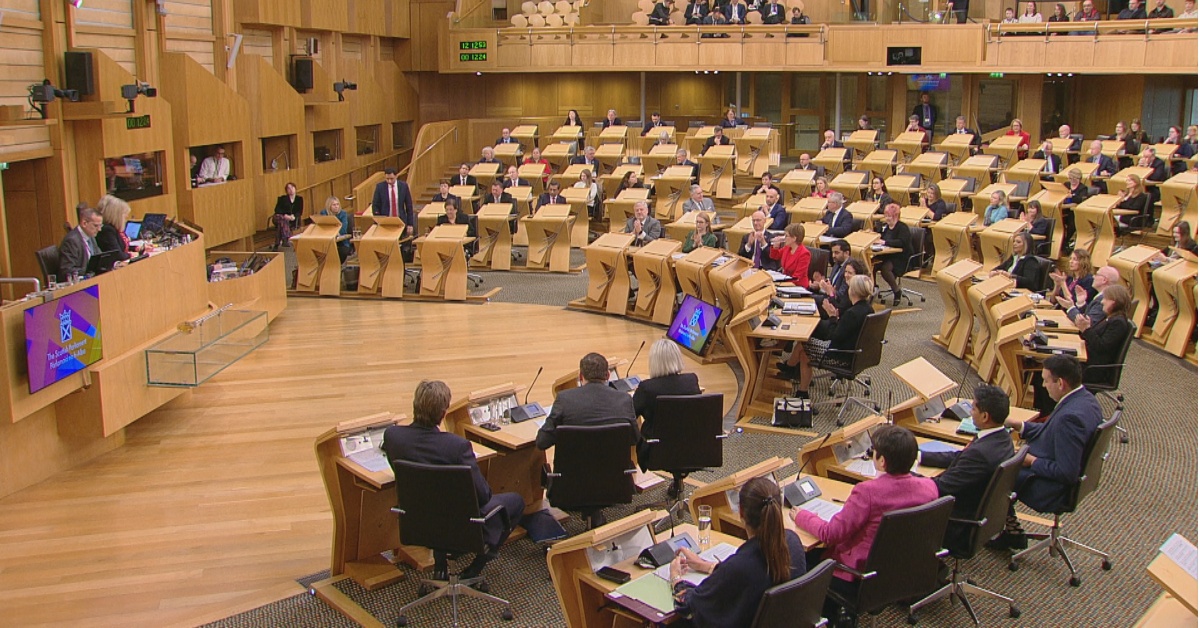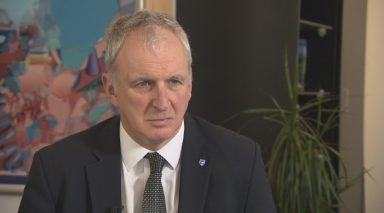Plans to reform how a transgender person changes the sex on their birth certificate have been passed in Scotland.
Marathon debates around more than 150 amendments took place over two days in Holyrood with 86 against 39 voting in favour of the reforms on Thursday.
The Scottish Government has insisted that the Bill will not introduce new rights for trans people, but is about “improving” the way that trans people gain legal recognition.
Supporters have celebrated the reforms is a small change helping to make the process for transgender people easier, less intrusive and distressing.
But opponents argue that the reforms will change who can access women-only services and make it easier for male offenders to enter single-sex spaces.
The Scottish Government insists the legislation will not impact the Equality Act, which allows for trans people to be excluded from single-sex spaces such as changing rooms and shelters, something that was affirmed by an earlier amendment from Labour’s Pam Duncan-Glancy.

What is the Gender Recognition Reform (Scotland) Bill?
The Bill will make it easier for trans people to acquire a gender recognition certificate (GRC) by removing the requirement for a diagnosis of gender dysphoria and introducing a system of self-declaration.
It will also lower the minimum age for applicants from 18 to 16 and drop the time required for an applicant to live in their acquired gender from two years to three months – six for people aged 16 and 17 – though with a subsequent, three-month reflection period.
What happened in parliament
MSPs debated 153 amendments lodged at stage three of the Bill.
It was initially set to go to a final vote on Wednesday, but it was pushed to Thursday afternoon due to the debate over amendments, while Tuesday and Wednesday’s debates went longer than any other in the history of the Scottish Parliament, with MSPs sitting until around 1.30am on Thursday morning.
On Tuesday, MSPs backed a change tabled by SNP MSP Gillian Martin to the law which meant anyone subject to a sexual harm prevention order or sexual offences prevention order would not be allowed to seek a GRC.
Meanwhile, a push by fellow SNP MSP to ensure applications would be paused if an applicant was charged with a sexual offence until their case was disposed of divided members by 61 votes to 61 – as is customary Deputy Presiding Officer Liam McArthur used his casting vote against the change.
The sitting on Tuesday was marred by protests from the public gallery, with opponents to the Bill shouting “shame on all of you” as another amendment that would make it harder for sex offenders to apply for a GRC was voted down.
Throughout proceedings, the Scottish Tories have made apparent attempts to make consideration take as long as possible with the raising of repeated points of order and pushing every amendment to a vote, even if the proposer chose not to do so.
Party leader Douglas Ross was even told he was close to “contempt of parliament” by the Deputy Presiding Officer after repeatedly pushing for a fuller explanation as to why a late amendment tabled by one of his MSPs would not be taken in the chamber.
When the vote was announced on Thursday, there was a huge round of applause in the chamber with cheering from the public gallery, followed by some shouts of “shame on you”. Parliament was then suspended.
Which parties have supported reforms?
All Holyrood parties except for the Conservatives expressed support for gender recognition reform in their 2021 manifesto. The Scottish Greens included gender reform as a key policy as part of their cooperation agreement with the SNP.
First Minister Nicola Sturgeon defended her Government’s Gender Recognition Reform Bill, saying it may be the “most scrutinised piece of legislation” in Holyrood’s history.
She said the need for a medical diagnosis is “one of the most intrusive, traumatic and dehumanising parts of the current system” and added : “I will never apologise for trying to spread equality, not reduce it, in our country.”
There has been backlash from SNP backbenchers and some Labour MSPs around the impact of the Bill.
Scottish Tories have insisted more time was needed to discuss changes to the Bill and described it as a “travesty of democracy,” leading to accusations of its MSPs using delaying tactics during Tuesday’s debate.
The Bill’s passage could raise further disciplinary issues within the SNP, with seven MSPs from the ruling party voting against it – including minister Ash Regan, who was forced to quit – and two others abstaining at stage one.
Ms Regan said during the consideration of amendments that she would not be supporting the Bill, while fellow SNP MSP Kenneth Gibson hinted he would again rebel against the Bill, and Fergus Ewing and Michelle Thomson spoke in favour of amendments the Scottish Government opposed.

How many people will be affected?
Around 30 gender recognition certificates are granted to people born or adopted in Scotland each year. The Scottish Government estimated this could increase to 250-300 applicants a year.
What do the opponents say?
Opponents of the law fear it could be a danger to women and girls, particularly around the provision of single sex spaces.
On Monday Victor Madrigal-Borloz, a UN expert on gender identity, and Reem Alsalem, the UN’s special rapporteur on violence against women, spoke to members of Holyrood’s equalities committee ahead of the debate.
Ms Alsalem said plans to introduce self-ID could see violent men taking advantage of loopholes “to get into women’s spaces and have access to women”.
However, Mr Madrigal-Borloz told the more than two-hour committee meeting there was “no evidence” that “maintaining complexity in the process of recognition of gender identity would be an effective safeguard”.
But the Scottish Government has insisted repeatedly that the legislation will not impact on the Equality Act, which allows for trans people to be excluded from single sex spaces such as changing rooms and shelters.
Follow STV News on WhatsApp
Scan the QR code on your mobile device for all the latest news from around the country


 STV News
STV News

























